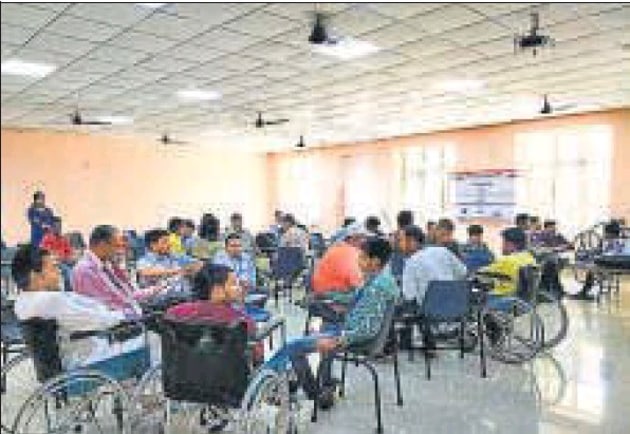Training differently abled to find new avenues for growth
ATPAR launched Network of Entrepreneurs with Disabilities for Assistance and Rehabilitation - NEDAR, to enable such participants to come together as a forum on Saturday.
At an early age, Deepak Kumar contracted polio. After class four, he dropped out as his crutches had broken and his family could not afford another.

Now 25, Kumar uses a wheelchair. He never thought he would be appreciated for his work in a room full of people. Nor did he ever imagine that he will be able to launch a business of his own.
But on Saturday he played a motivating Bollywood number from a multi-functional bluetooth speaker, which he manufactured, and that doubles up as an emergency light and a power bank to charge a mobile phone.
He is one of the around 150 such participants in the city battling disabilities and the odds of life that come along, who were trained in entrepreneurial skills and encouraged to be financially independent by set up their own businesses over the last two year.
ATPAR (Alliance to Promote Abilities and Rehabilitation LLP), a social enterprise company provides the Entrepreneurship Development Training (EDP) for persons with disabilities in collaboration with the government’s National Small Industries Corporation (NSIC) centre at Okhla. ATPAR launched NEDAR (Network of Entrepreneurs with Disabilities for Assistance and Rehabilitation) to enable such participants to come together as a forum on Saturday.
Deepak had enrolled in the Entrepreneurship Development Programme (EDP) last year and has now set up a small workshop out of his home.
“I learnt to repair electronic devices and made around ₹3,000-4,000 a month earlier. It was only after I enrolled for this training that I realised I could set up my own venture,” said Deepak, a resident of Jaitpur in southeast Delhi. “I sell my speakers to be used as audio systems in auto-rickshaws and e-rickshaws. I now make around ₹8,000 -9,000 out of my business.”
Also read: Out as free men, these inmates long for a prison term to ‘return home’
For class 12 pass Ranjeeth Kumar, who suffers from lower body disability, it has now become much easier to provide for his family after he underwent the training. He owns R K Fashion, a garments manufacturing unit in Jaitpur and has engaged a staff of 12.
“I had a small shop earlier but I never drew my own salary out of the profit. In the training, I learnt how to keep records and maintain employees. I have expanded my business from just manufacturing t-shirts and track pants to school uniforms and have started getting bulk orders. I am now able to make around ₹22,000- 25,000 a month from ₹10,000-12,000 earlier,” said Ranjeeth, who got the opportunity to address his colleagues for the first time from the stage.
Many others like them have been able to either set up or expand their small-time businesses. Others have got business ideas to be materialised.
Nazish, 23, who has to use crutches to walk and has completed a computer course from Industrial Training Institute (ITI), said she wants to open her own dairy farm and plans to apply for a loan for the same.
Differently abled people face multiple challenges such as lack of support both from government and society. Even in case of reservation, only specific jobs are reserved in the public sector, which are not suited for all kinds of disabilities.
“A large number of persons with disabilities are unable to access the job market and derive benefits from the skill development and open employment opportunities. Nedar was to provide an inclusive training platform to help people turn their talent into enterprise. We aim to create a network of such people, who would act as a support group to enable businesses to grow and promote self-employment,” said, Thilakam Rajendran, co-founder, ATPAR.
Ira Singhal, a 2015 batch IAS officer, who currently appointed as deputy commissioner, North Corporation, was the first differently-abled candidate to top the civil services exam and had attended the event to address the participants, said, “Disability is no bar to realizing one’s dreams. Differently-abled must not have this fixed idea of just depending on government jobs. Starting a venture of your own could help transform your life. Though there are still challenges in the ecosystem needed for boosting opportunities for the disabled, becoming self-reliant is the only solution.”
Also read: Child rights panel, NGO tie up for aftercare to juveniles






